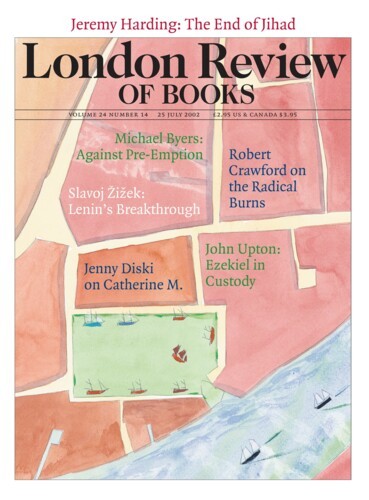Bloodaxe, the independent poetry publishers, are excited. Their new anthology, Staying Alive: Real Poems for Unreal Times, is, they claim, set to topple The Nation’s Favourite Poems as the bestselling poetry book in the UK. This is good news for poetry publishing. The anthology of the nation’s soon-to-be second-favourite poems was brought to us by the BBC, who need no further encouragement. For one thing they were responsible for Truly, Madly, Deeply, in which Alan Rickman plays a ghost who tries to help his widow (Juliet Stevenson) come to terms with his untimely death. One of the tricks he tries is to recite Pablo Neruda’s ‘Dead Woman’ (‘I shall stay alive,/because above all things you wanted me’) – a fact advertised in an essay in the Bloodaxe anthology, the point being that you need such moving filmic moments to sell the poem concept to a public that contemporary poetry is supposed to have alienated. I’d erased that sequence from my memory, though I won’t forget Rickman turning his cello round guitar-wise to launch into a homespun but immensely powerful rendition of the Walker Brothers’ ‘The Sun Ain’t Gonna Shine Any More’ – a moment that had me in tears to rival Stevenson’s each of the six times I watched it. Perhaps significantly, the original version of the song was playing in the Blind Beggar on the Whitechapel Road on the night in 1966 when Ronnie Kray shot George Cornell with a 9mm Mauser; a stray bullet caused the jukebox to get stuck in a groove and to keep repeating the chorus. Which must have been poignant. Some songs, abetted by the movies they appear in, have always managed to perform the feat of perfect timing (summing up the moment, seeming to say everything, helping you through unreal times etc). This has been convenient for the record industry: see, for instance, the Bee Gees’ soundtrack to Saturday Night Fever, a story of redemption through disco, which sold 70 million copies. The key to its success was surely the fact that the original version of ‘Staying Alive’ is played over its superlative opening sequence.
I’m truly susceptible to moments of manipulative sentiment, I admit: but this doesn’t mean I’m proud of it. Which is why I’m saddened by the packaging of Staying Alive (the Bloodaxe version). Its most fervent admirer among those who plug it in its many blurbs is John Berger, who writes:
I live in France. I take this book everywhere with me. And almost every day I find myself opening it to translate a poem to somebody after a discussion or a joke or a conversation. Maybe to a Polish building worker, maybe to two lovers, or a grandmother or a peasant or a teacher. I make crude translations, but afterwards I hear a sudden intake of breath, a shared laugh or I see a silent nod of the head.
If this is the kind of thing it leads to, perhaps poetry should be banned. Shameless sentimentality is understandable if you’re talking about certain kinds of music, but I don’t like the idea that people have to be tricked into reading poetry – or bribed. According to Neil Astley, the volume’s editor, the second pivotal cinema moment for the renaissance of poetry in the popular imagination is the bit in Four Weddings and a Funeral when John Hannah reads Auden’s ‘Funeral Blues’ over Simon Callow’s coffin. Astley remarks: ‘Poems about death also help others to gain inner strength by sharing in the writer’s experience of facing death and bereavement at a time when they themselves are still being tossed on the unpredictable tides of grief.’ If poetry does help us through those unreal times, we’d do better to keep the fact to ourselves, and leave the Polish building workers alone. In any case, the 500 poems in Staying Alive – well, most of them – don’t need any assistance. If you ignore the huggy, self-help element, it’s a very good anthology indeed.
Poets, happily, are less likely than editors or publicists to make claims about the power of poetry to do good. Auden and Marianne Moore (whose poem ‘Poetry’ begins: ‘I, too, dislike it’) both claimed to think that novels were far better things than poems – though whether this was straight talking or slyly endearing self-effacement isn’t clear. For those who find novels a help at unreal times, the Observer has prepared a map of the world decorated with little boxes that contain suggested reading matter for various summer holiday destinations. For Ireland, the Observer says, don’t forget to pack Round Ireland with a Fridge by Tony Hawks. Antarctica? Take Skating to Antarctica by Jenny Diski. Auden, who liked to be contrary, had a theory that the best books for travelling with are those that have least to do with the place you’re travelling to. I’m staying put this summer. If I’m to believe Auden I should be reading In Siberia by Colin Thubron, or perhaps Muddling through in Madagascar by Dervla Murphy.
Send Letters To:
The Editor
London Review of Books,
28 Little Russell Street
London, WC1A 2HN
letters@lrb.co.uk
Please include name, address, and a telephone number.

